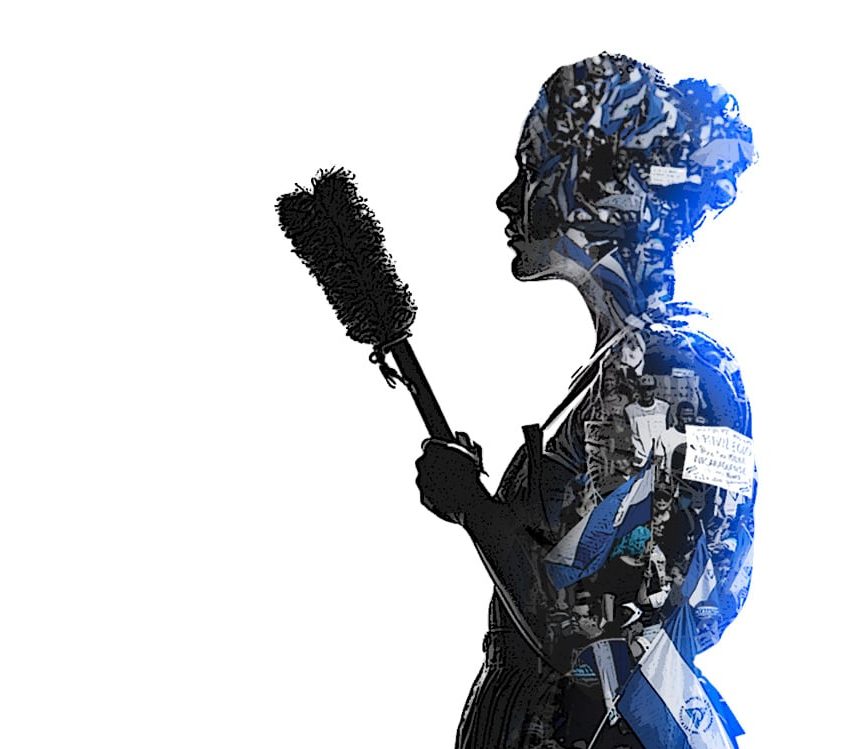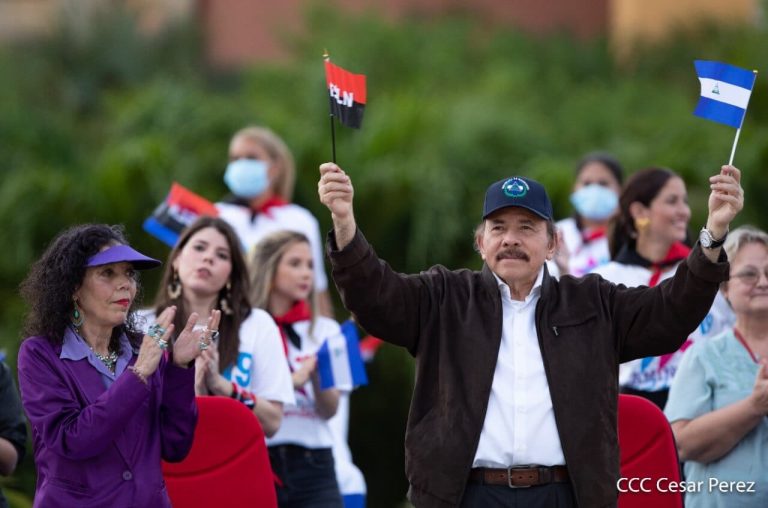21 de julio 2021

"My Neighbors Have Threatened Me With Jail"

PUBLICIDAD 1M
PUBLICIDAD 4D
PUBLICIDAD 5D
The leader celebrates the April repression, accuses “U.S imperialism” of laundering money for “terrorism” and calls the businessmen miserable

The president and candidate for reelection, Daniel Ortega, celebrated the 42nd anniversary of the Sandinista Revolution with a party event in which he did not mention the presidential elections to be held on November 7, but alleged that his government faces a United States conspiracy, and assured that “the armed population will never be crushed.”
In a nationally televised speech from Revolution Square in Managua, Ortega demanded respect for Nicaragua's sovereignty, while affirming that “U.S imperialism” has tried to destroy the country without success.
“Although they have wanted to destroy the economy and have murdered, sowed terror, they have laundered millions of millions of dollars in Nicaragua to sow terrorism” Ortega accused, and continued on to day that “investigations are being carried into the famous foundations (in allusion to the accusations against the Violeta Barrios de Chamorro Foundation and Funides) of millions of dollars to be used to try to destroy the Nicaraguan people. They have failed,” affirmed the President.
Ortega's accusations against the United States coincide with his diplomatic rapprochement with Russia, while the rest of the international community demands him to stop human rights violations after the repressive escalation initiated since the end of last May in which 26 people were captured, among them six presidential aspirants, fifteen opposition leaders and two business leaders.
Hours before the party activity, Russian Foreign Minister Sergey Lavrov declared in Moscow that he rejected “interference” against Nicaragua in the November elections, in an event in which he received Foreign Minister Denis Moncada and two of Ortega's sons, Rafael and Laureano Ortega Murillo, both sanctioned by the United States.
The Managua event was presided over by the Army and Police chiefs, the presidents of the National Assembly, the Supreme Electoral Council, the Supreme Court of Justice, and political operator Fidel Moreno.
This year, the only international guest accompanying the presidential family on July 19 was Kove Daur, the foreign minister of Abkhazia, a separatist nation of Georgia which only has diplomatic recognition from Russia, Venezuela, Nicaragua, Bolivia, and some island nations of Oceania.
Ortega accused “imperialism” of trying to dominate the Russians and also China. “They’re crazy!” he assured. Not even Cuba sent a delegate, and Ortega, who did not mention the massive protests that took place on the island since July 11, had to make do with a letter sent on July 18 by Raul Castro and President Miguel Diaz-Canel, in which they sent him “revolutionary hugs”.
The president announced an increase in the budget of the Republic, with which he will increase the salary of public employees by five percent, which had not happened since March 2018, according to journalistic publications. He attributed the increase to the “fiscal discipline” of the Government, while the Intelligence Unit of The Economist stated that the decisions of the Nicaraguan Executive in the coming months would be taken with electoral criteria.
Towards businessmen, who were his allies until the political crisis broke out in 2018, the caudillo had harsh words about the execution of the tax collection policy.
“Those businessmen who have been talking about closing companies, well, they simply do not close because they know they are winning. And if they were not earning, they would not be paying the taxes they are paying,” said Ortega.
“These people who curse the cow but swallow the milk, have no option left but to keep working, because they know that they are winning. The thing is that they are miserable. They have no sensitivity for the people” he attacked.
The regime celebrated the act in an amphitheater set up in the square, in which two stars with the number 42 and 19 were placed in the center, surrounded by benches from where members of the Sandinista Youth participated in the choreographies of the state propaganda.
Some people squeezed in to watch Ortega's entrance to the Plaza of the Revolution, guarded by dozens of policemen, and although there was no call for a massive act, caravans of Sandinista militants toured the neighborhoods.
From the beginning, Rosario Murillo’s protagonism was notable in everything that was programmed. During her first intervention she spoke for 17 minutes, and then, among the poems that were set to music by the groups that participated in the act, there was a paragraph she read last July 15, in which she attacked the U.S. Ambassador Kevin Sullivan without directly mentioning him in one of her midday addresses.
“There is one who, with his arrogance that opens up in the corridors over there in the White House, does not respect diplomacy. Now, if he wants to talk, let him take off his investiture, and he will see how short his stay in this land is. And we are not talking about war, only about demanding that he speaks “crap”, just elsewhere,” Murillo's text was heard in a song by the Rústicos del Norte.
In addition to the fall of Somoza in 1979, the Government party celebrates what it calls the liberation of the “roadblocks of death” in 2018, as it calls the violent clearing of the barricades erected by the population to avoid the aggressions of paramilitaries and police. In those days of 2018, the repression left at least 328 people killed.
Reopening wounds, Ortega called commissioner general Ramón Avellán a “hero” on Monday, while Avellán has been signaled out by the United States for his involvement in serious human rights violations and was the person in charge of “liberating” Masaya during the harshest days of state repression.
According to Ortega, Avellán was saying 'don't shoot' to his fellow officers and he added “the terrorists were flying bullets, financed by the Yankees and the oligarchy”, referring to the demonstrators.
“It was a provocation. They wanted the Police to react and a massacre to take place. It was a lie that they had the police cornered (in Masaya). They resisted and were defeated with the stroke of a pen when the decision was made. They believed that they were overthrowing the institutions of the State”, assured Ortega.
For the ruler, the April demonstrations sought to put an end to the “revolution”, a crisis to which the pandemic and the sanctions imposed on his officials and family members by the United States, Canada and the European Union were added, which he qualifies as “aggressions” against Nicaragua.
In his speech, Ortega also called Brenda Rocha, who lost her arm in a Contra attack during the civil war of the eighties and is currently the president of the Supreme Electoral Council, a hero. She represents an institution entirely controlled by the Government party, one of the reasons that prevents guarantees for the holding of free and democratic elections.
This article was originally published in Spanish in Confidencial and translated by our staff
Archivado como:
PUBLICIDAD 3M
Periodista nicaragüense, exiliado. Comenzó su carrera en el año 2000, cuando todavía era estudiante. Por sus destacadas investigaciones periodísticas ha ganado el Premio Ortega y Gasset, el Premio Internacional de Periodismo Rey de España, el Premio a la Excelencia de la Sociedad Interamericana de Prensa, y el Premio Latinoamericano de Periodismo de Investigación del Instituto Prensa y Sociedad (IPYS).
PUBLICIDAD 3D